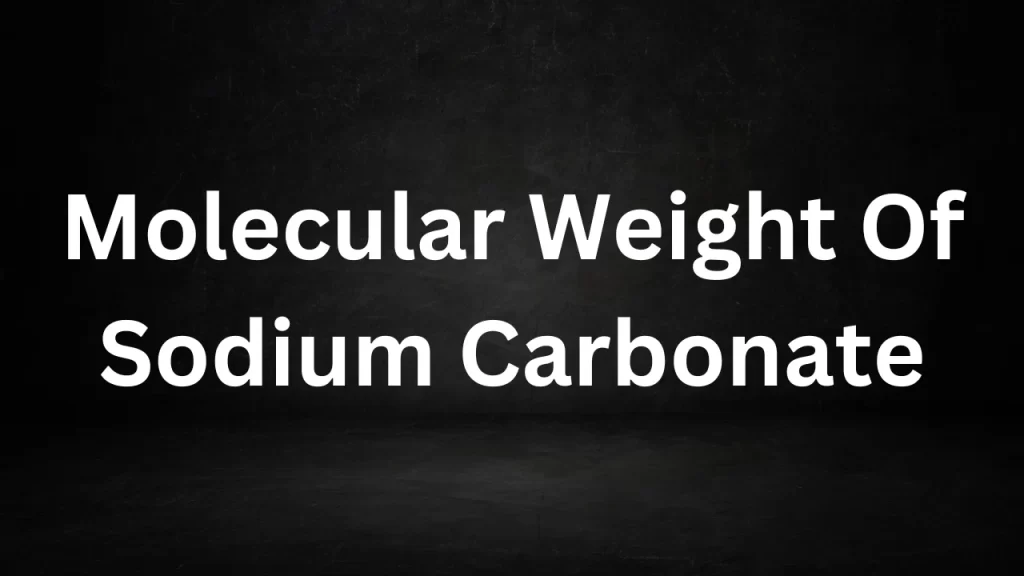Molecular Weight Of Sodium Carbonate
Molecular Weight Of Sodium Carbonate: Sodium carbonate, commonly known as soda ash or washing soda, is a chemical compound with the molecular formula Na2CO3.
Understanding its molecular weight is fundamental in various fields, including chemistry, industry, and environmental science.
In this article, we delve into the concept of molecular weight and explore the significance of knowing the molecular weight of sodium carbonate.

Molecular Weight Of Sodium Carbonate
Definition of Molecular Weight
Molecular weight, also known as molar mass or molecular mass, is a measure of the mass of a molecule. It is defined as the sum of the atomic weights (masses) of all the atoms in a molecule. The unit of molecular weight is the atomic mass unit (amu) or unified atomic mass unit (u). For convenience, molecular weights are often expressed in grams per mole (g/mol).
Calculating the Molecular Weight of Sodium Carbonate
To calculate the molecular weight of sodium carbonate (Na2CO3), we need to sum the atomic weights of all the constituent atoms:
- Sodium (Na) has an atomic weight of approximately 22.99 amu.
- Carbon (C) has an atomic weight of roughly 12.01 amu.
- Oxygen (O) has an atomic weight of about 16.00 amu.
Now, let’s calculate the molecular weight:
Molecular Weight of Na2CO3 = (2 * Atomic Weight of Na) + Atomic Weight of C + (3 * Atomic Weight of O)
Molecular Weight of Na2CO3 = (2 * 22.99 amu) + 12.01 amu + (3 * 16.00 amu)
Mole Weight of Na2CO3 ≈ 45.98 amu + 12.01 amu + 48.00 amu
Mole Weight of Na2CO3 ≈ 105.99 amu (or g/mol)
So, the molecular weight of sodium carbonate is approximately 105.99 g/mol.
Significance of Mole Weight of Sodium Carbonate
Understanding the mole weight of sodium carbonate holds several practical implications:
- Chemical Formulation: The mole weight provides the exact mass of one mole of sodium carbonate molecules. This is essential for precise chemical formulations and reactions in laboratories and industries.
- Stoichiometry: In chemical reactions, the molecular weight plays a crucial role in stoichiometry, helping scientists and engineers determine the quantities of reactants and products.
- Dosage Calculation: In various applications, such as water treatment and detergents, the molecular weight is vital for calculating the appropriate dosage of sodium carbonate needed to achieve specific results.
- Environmental Impact: In environmental science, understanding the molecular weight aids in assessing the impact of sodium carbonate on ecosystems and water quality when it is used or released.
- Quality Control: Industries that produce sodium carbonate products rely on accurate molecular weight data to maintain quality control standards.
In conclusion, the mole weight of sodium carbonate, approximately 105.99 g/mol, is a crucial parameter in various scientific, industrial, and environmental contexts. It enables precise calculations, formulations, and assessments, ultimately contributing to the efficient and responsible use of this important chemical compound.
Read More
- Difference Between Isothermal And Adiabatic Process
- Simple Harmonic Motion Examples
- Molecular Mass Of Calcium
- Lumen Meaning In Biology
- Molar Mass of Chlorine
Frequently asked questions (FAQs) On Mole Weight Of Sodium Carbonate
1. What is the mole formula of sodium carbonate?
The mole formula of sodium carbonate is Na2CO3, indicating that each molecule contains two sodium (Na) atoms, one carbon (C) atom, and three oxygen (O) atoms.
2. What is the mole weight of sodium carbonate?
The mole weight of sodium carbonate (Na2CO3) is approximately 105.99 grams per mole (g/mol).
3. Why is it important to know the mole weight of sodium carbonate?
Knowing the mole weight is essential for accurate chemical calculations, including determining reactant and product quantities in chemical reactions, dosage calculations in various applications, and quality control in industries.
4. How is the mole weight of sodium carbonate calculated?
The mole weight of sodium carbonate is calculated by summing the atomic weights of all the constituent atoms in its chemical formula: 2 * Atomic Weight of Sodium (Na) + Atomic Weight of Carbon (C) + 3 * Atomic Weight of Oxygen (O).
5. What are some common uses of sodium carbonate in everyday life?
Sodium carbonate has a wide range of applications, including as a cleaning agent (in laundry detergents and household cleaners), in water treatment, as a food additive, and in various industrial processes.